Lily Xu
@lilyxu.bsky.social
Assistant prof at Columbia IEOR developing AI for decision-making in planetary health.
https://lily-x.github.io
https://lily-x.github.io
Columbia University is launching a new MS in Biodiversity Data Analytics to start in fall 2026!
Join the launch event to discuss analytics and data science for nature in business, investment, and policy.
Wed, Nov 5
6–8pm
@columbiauniversity.bsky.social in NYC or remote
Join the launch event to discuss analytics and data science for nature in business, investment, and policy.
Wed, Nov 5
6–8pm
@columbiauniversity.bsky.social in NYC or remote

October 16, 2025 at 12:38 PM
Columbia University is launching a new MS in Biodiversity Data Analytics to start in fall 2026!
Join the launch event to discuss analytics and data science for nature in business, investment, and policy.
Wed, Nov 5
6–8pm
@columbiauniversity.bsky.social in NYC or remote
Join the launch event to discuss analytics and data science for nature in business, investment, and policy.
Wed, Nov 5
6–8pm
@columbiauniversity.bsky.social in NYC or remote
Come be our colleague at Columbia IEOR! Open-rank (tenure-track or tenured) position with a priority deadline of November 21.
Candidates with application-oriented research are especially encouraged to apply.
apply.interfolio.com/175698
Candidates with application-oriented research are especially encouraged to apply.
apply.interfolio.com/175698

October 13, 2025 at 4:41 PM
Come be our colleague at Columbia IEOR! Open-rank (tenure-track or tenured) position with a priority deadline of November 21.
Candidates with application-oriented research are especially encouraged to apply.
apply.interfolio.com/175698
Candidates with application-oriented research are especially encouraged to apply.
apply.interfolio.com/175698
Columbia is hiring a tenure-track asst. prof. in computational ecology and evolution!
If you use or develop computational tools—AI, data science, stats—to deepen our understanding of eco/evo, evaluate nature-based solutions, or inform and manage impacts on human wellbeing, please apply!
If you use or develop computational tools—AI, data science, stats—to deepen our understanding of eco/evo, evaluate nature-based solutions, or inform and manage impacts on human wellbeing, please apply!

October 1, 2025 at 9:50 PM
Columbia is hiring a tenure-track asst. prof. in computational ecology and evolution!
If you use or develop computational tools—AI, data science, stats—to deepen our understanding of eco/evo, evaluate nature-based solutions, or inform and manage impacts on human wellbeing, please apply!
If you use or develop computational tools—AI, data science, stats—to deepen our understanding of eco/evo, evaluate nature-based solutions, or inform and manage impacts on human wellbeing, please apply!
Dave Thau, @sarameghanbeery.bsky.social, and I are organizing biodiversity webinar talks for @itu.int AI for Good.
Next week, I'll chat with Iadine Chades (Monash) on the promise and impact of decision AI for biodiversity.
Please share questions you'd love to ask Iadine or our upcoming speakers!
Next week, I'll chat with Iadine Chades (Monash) on the promise and impact of decision AI for biodiversity.
Please share questions you'd love to ask Iadine or our upcoming speakers!
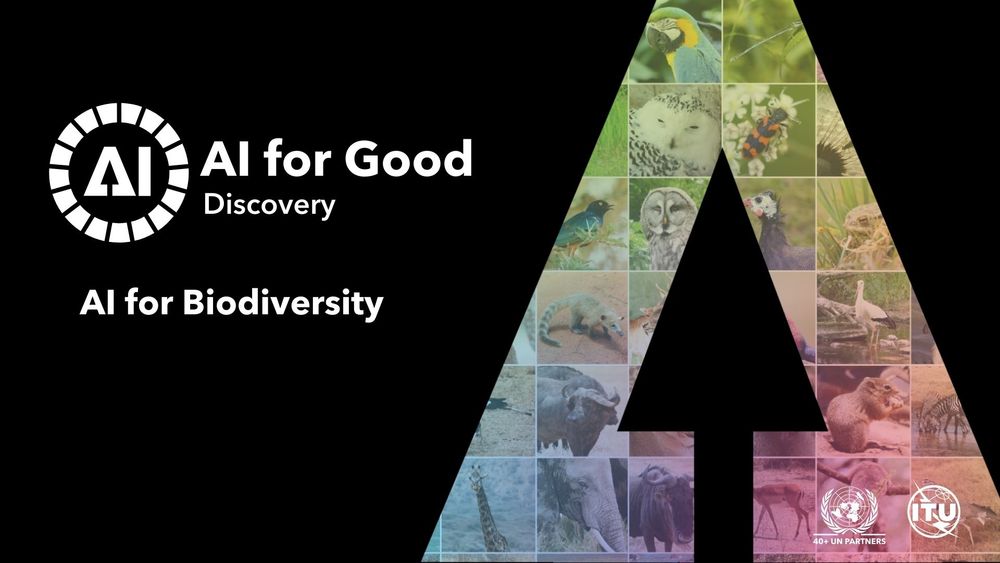

May 15, 2025 at 5:52 PM
Dave Thau, @sarameghanbeery.bsky.social, and I are organizing biodiversity webinar talks for @itu.int AI for Good.
Next week, I'll chat with Iadine Chades (Monash) on the promise and impact of decision AI for biodiversity.
Please share questions you'd love to ask Iadine or our upcoming speakers!
Next week, I'll chat with Iadine Chades (Monash) on the promise and impact of decision AI for biodiversity.
Please share questions you'd love to ask Iadine or our upcoming speakers!
I'm hiring for a machine learning data scientist & research assistant for summer 2025!
Join me on a project on invasive species management with an innovative startup doing on-the-ground removal of environmentally destructive invasive animals.
Paid, full-time w/ possibility to extend.
Join me on a project on invasive species management with an innovative startup doing on-the-ground removal of environmentally destructive invasive animals.
Paid, full-time w/ possibility to extend.
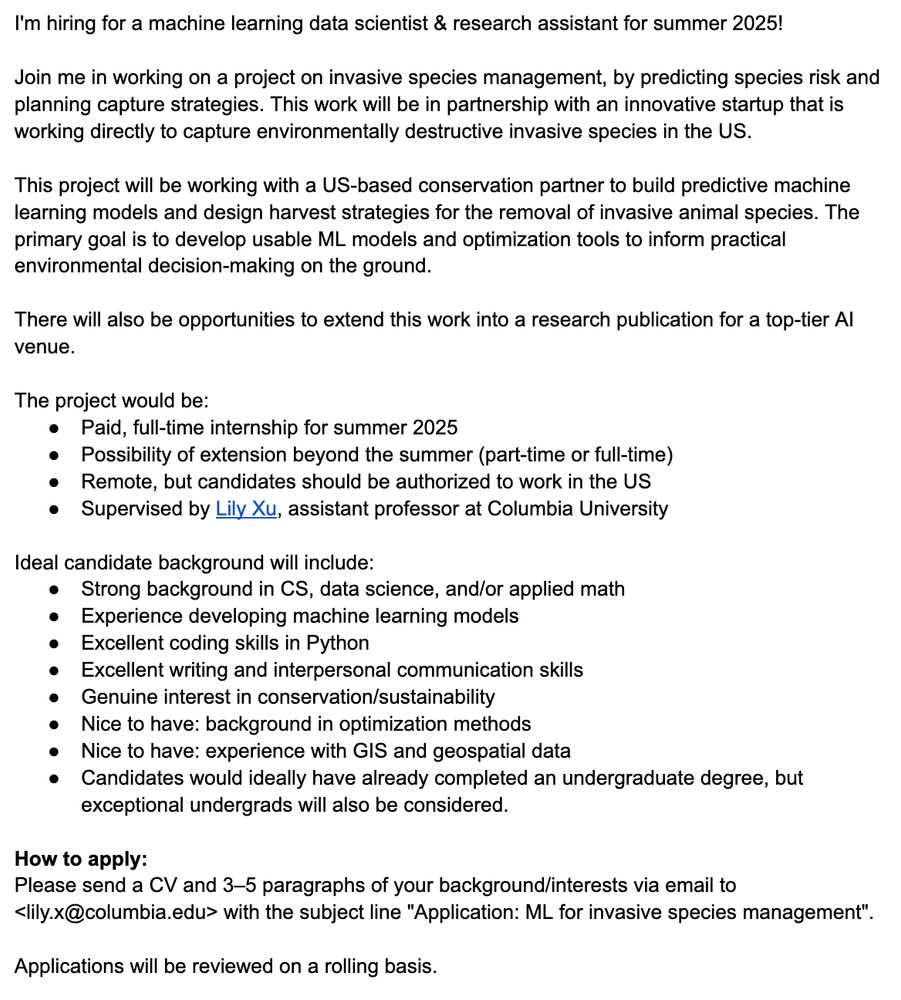
April 25, 2025 at 1:50 AM
I'm hiring for a machine learning data scientist & research assistant for summer 2025!
Join me on a project on invasive species management with an innovative startup doing on-the-ground removal of environmentally destructive invasive animals.
Paid, full-time w/ possibility to extend.
Join me on a project on invasive species management with an innovative startup doing on-the-ground removal of environmentally destructive invasive animals.
Paid, full-time w/ possibility to extend.
Reinforcement learning with combinatorial actions for coupled restless bandits
Paper: arxiv.org/abs/2503.01919
Code: github.com/lily-x/combi...
Join our #ICLR2025 poster session!
Friday, Apr 25 @ 3–5:30pm SGT
Paper: arxiv.org/abs/2503.01919
Code: github.com/lily-x/combi...
Join our #ICLR2025 poster session!
Friday, Apr 25 @ 3–5:30pm SGT
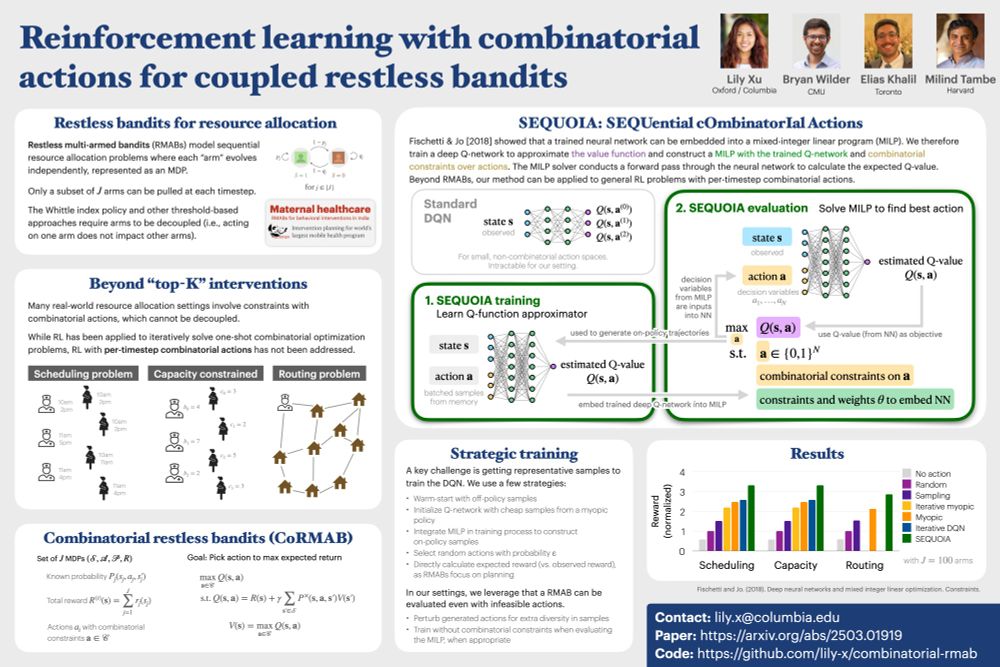
April 1, 2025 at 2:38 PM
Reinforcement learning with combinatorial actions for coupled restless bandits
Paper: arxiv.org/abs/2503.01919
Code: github.com/lily-x/combi...
Join our #ICLR2025 poster session!
Friday, Apr 25 @ 3–5:30pm SGT
Paper: arxiv.org/abs/2503.01919
Code: github.com/lily-x/combi...
Join our #ICLR2025 poster session!
Friday, Apr 25 @ 3–5:30pm SGT
Our SEQUOIA method significantly improves performance above baseline approaches, which are either myopic (neglecting the sequential nature of RMABs and other MDPs) or non-combinatorial (using heuristic, iterative approaches to solve the NP-hard combinatorial constraints).
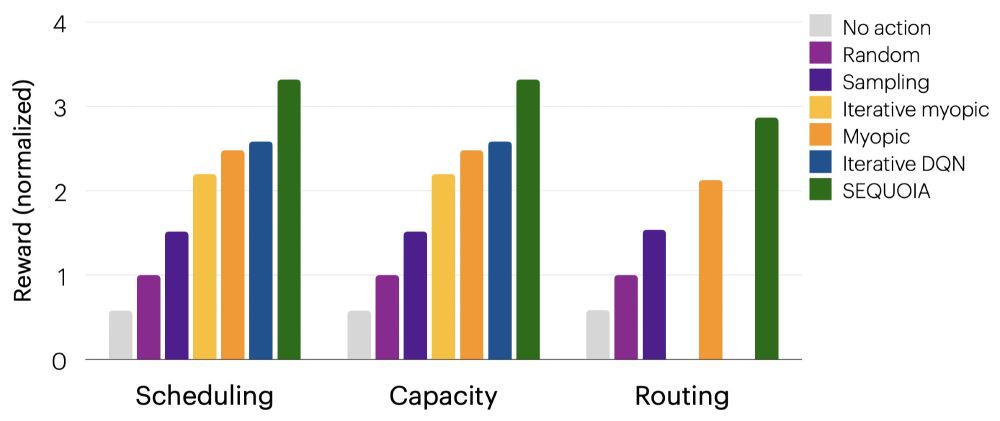
April 1, 2025 at 2:38 PM
Our SEQUOIA method significantly improves performance above baseline approaches, which are either myopic (neglecting the sequential nature of RMABs and other MDPs) or non-combinatorial (using heuristic, iterative approaches to solve the NP-hard combinatorial constraints).
Our method combines:
— DQN: deep Q-network to approximate the value function
— MILP solving: a mixed-integer program to embed combinatorial constraints over actions
The MILP solver implicitly conducts a forward pass through the neural network to compute the expected Q-value.
— DQN: deep Q-network to approximate the value function
— MILP solving: a mixed-integer program to embed combinatorial constraints over actions
The MILP solver implicitly conducts a forward pass through the neural network to compute the expected Q-value.
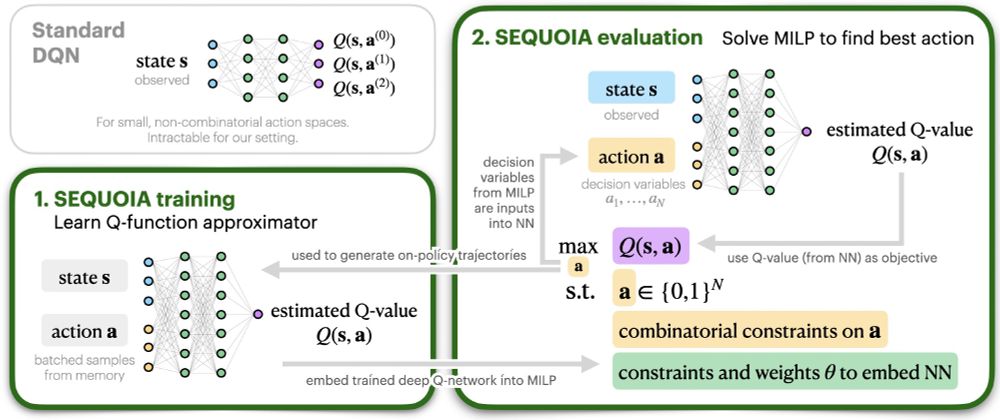
April 1, 2025 at 2:38 PM
Our method combines:
— DQN: deep Q-network to approximate the value function
— MILP solving: a mixed-integer program to embed combinatorial constraints over actions
The MILP solver implicitly conducts a forward pass through the neural network to compute the expected Q-value.
— DQN: deep Q-network to approximate the value function
— MILP solving: a mixed-integer program to embed combinatorial constraints over actions
The MILP solver implicitly conducts a forward pass through the neural network to compute the expected Q-value.
We focus on planning for restless bandits (RMABs), a form of constrained MDPs. RMABs are used for public health planning with ARMMAN, an NGO in India.
Traditional RMABs model only knapsack "top-K" actions, which do not capture many practical constraints such as scheduling or path-planning.
Traditional RMABs model only knapsack "top-K" actions, which do not capture many practical constraints such as scheduling or path-planning.

April 1, 2025 at 2:38 PM
We focus on planning for restless bandits (RMABs), a form of constrained MDPs. RMABs are used for public health planning with ARMMAN, an NGO in India.
Traditional RMABs model only knapsack "top-K" actions, which do not capture many practical constraints such as scheduling or path-planning.
Traditional RMABs model only knapsack "top-K" actions, which do not capture many practical constraints such as scheduling or path-planning.
Can we use RL to plan with combinatorial constraints?
Our #ICLR2025 paper combines deep RL with mathematical programming to do so! We embed a trained Q-network into a mixed-integer program, into which we can specify NP-hard constraints.
w/ brwilder.bsky.social, Elias Khalil, Milind Tambe
Our #ICLR2025 paper combines deep RL with mathematical programming to do so! We embed a trained Q-network into a mixed-integer program, into which we can specify NP-hard constraints.
w/ brwilder.bsky.social, Elias Khalil, Milind Tambe
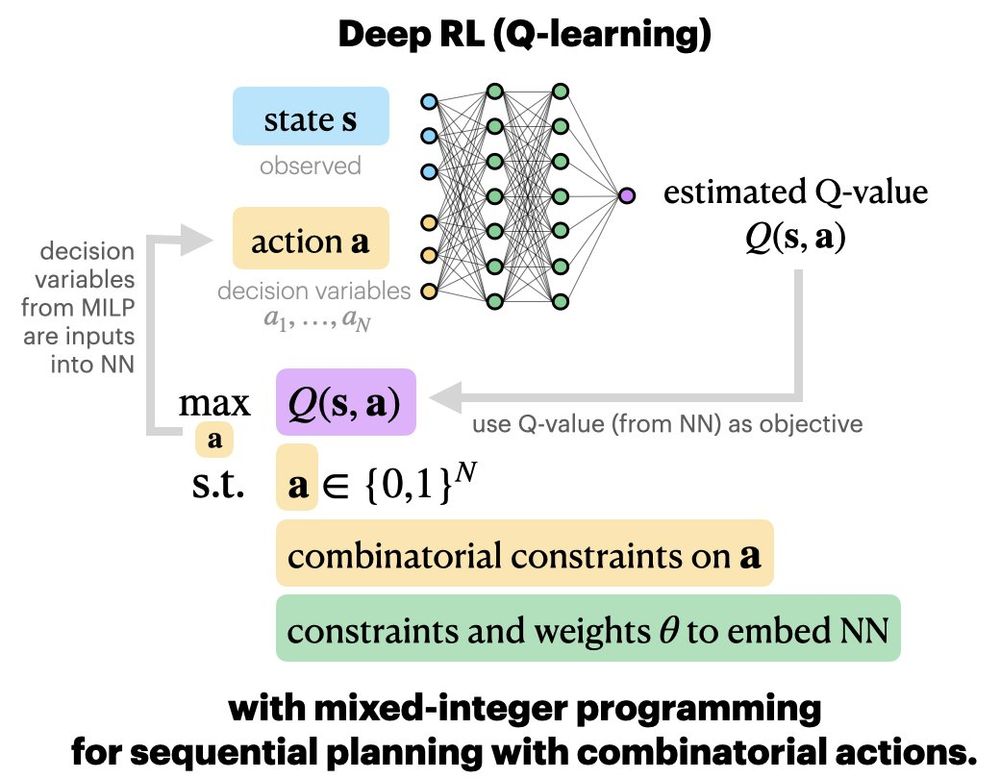
April 1, 2025 at 2:38 PM
Can we use RL to plan with combinatorial constraints?
Our #ICLR2025 paper combines deep RL with mathematical programming to do so! We embed a trained Q-network into a mixed-integer program, into which we can specify NP-hard constraints.
w/ brwilder.bsky.social, Elias Khalil, Milind Tambe
Our #ICLR2025 paper combines deep RL with mathematical programming to do so! We embed a trained Q-network into a mixed-integer program, into which we can specify NP-hard constraints.
w/ brwilder.bsky.social, Elias Khalil, Milind Tambe
Our paper on unlocking the value of ranger-based monitoring (RBM), now out in Conservation Letters!
Our work is a practical guide on when RBM may be useful for biodiversity conservation and protected area management, with some hard-won lessons for implementing RBM effectively.
🐘🌳🪺🤳🥾🪖
Our work is a practical guide on when RBM may be useful for biodiversity conservation and protected area management, with some hard-won lessons for implementing RBM effectively.
🐘🌳🪺🤳🥾🪖
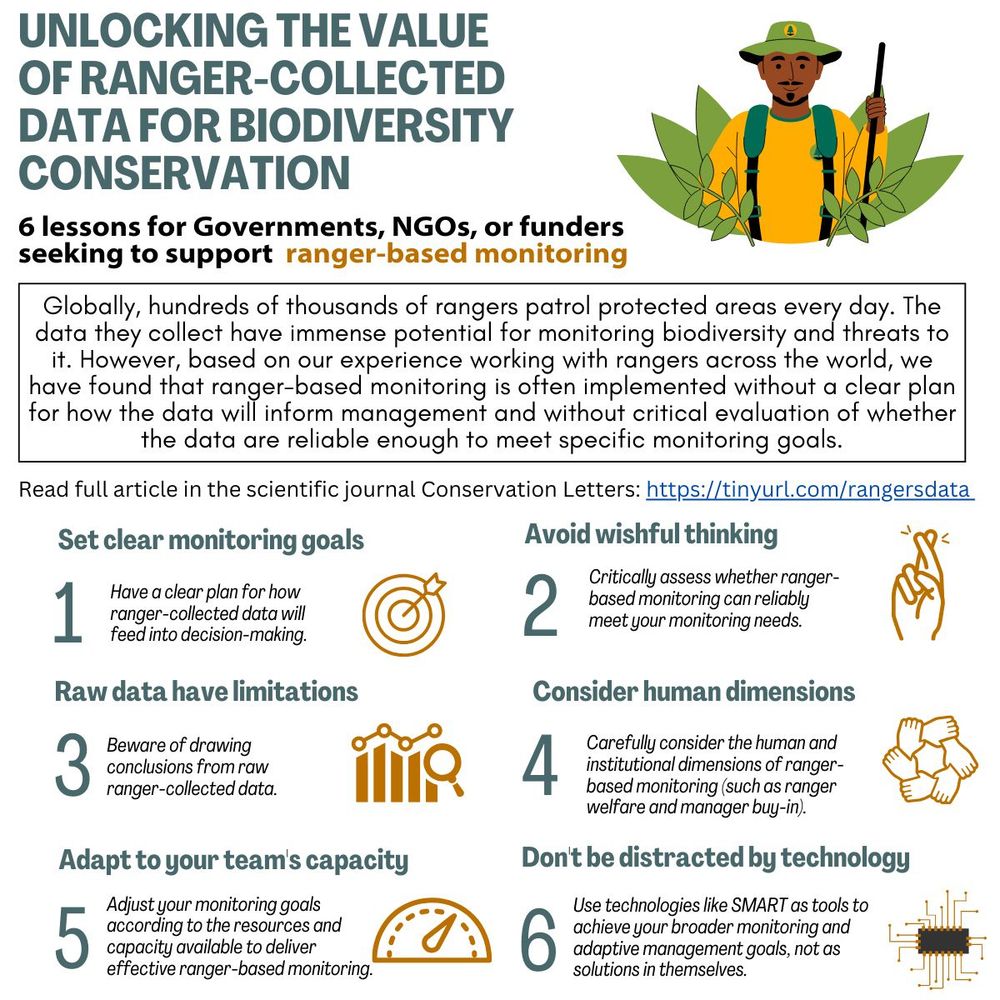
January 23, 2025 at 3:11 PM
Our paper on unlocking the value of ranger-based monitoring (RBM), now out in Conservation Letters!
Our work is a practical guide on when RBM may be useful for biodiversity conservation and protected area management, with some hard-won lessons for implementing RBM effectively.
🐘🌳🪺🤳🥾🪖
Our work is a practical guide on when RBM may be useful for biodiversity conservation and protected area management, with some hard-won lessons for implementing RBM effectively.
🐘🌳🪺🤳🥾🪖

